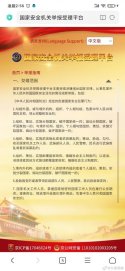Points on the Chinese question. From simple to complex:
The fact is that China is experiencing an exponential increase in cases of Covid-19, something new for that population and something very related to the complete relaxation of restrictions in the West. But not only that. The draconian measures that we have been observing for months are fundamental to understanding certain things. People are tired of confinement. This is normal. It is part, even if it is for the noblest of causes: human life. But something I've always noticed in China is a coordination problem between national and local government. For example, I have often read cases of mayors of cities in the interior forcing bank managers to grant millionaire loans when the order in the central government was monetary tightening. In China, the mayor of a city is not a building manager. He is manager of the local development process and his performance is what guarantees internal advancement. It is clear that there is a policy of slow, gradual and safe increase in the relaxation of restrictions while local governments are doubling down on showing that their province has no cases of Covid. This is a political time bomb of great magnitude that idiotic simplifications like dictatorship x democracy explain absolutely nothing. The question is to know what are the limits of centralization and decentralization.
On the other hand, there is an ongoing dispute. The party was pressured to weaken Xi, but it strengthened him. This did not please the global powers, but it still infuriates internal sectors defeated in the middle of the dispute - some of which are mafiosi -, who will use what they have at hand and the attention to the political protagonism of billionaires so that these protests descend into a counterrevolutionary rebellion like the one in 1989. Xi Jinping will have to take short-term measures on this, which will mainly affect the economy. But in the medium and long term, the fight is political and on a large scale.
By the way, let's not be naïve, there is a clear indication of hybrid warfare, Xi warned about color revolutions at this year's SCO Summit:
The fact is that China is experiencing an exponential increase in cases of Covid-19, something new for that population and something very related to the complete relaxation of restrictions in the West. But not only that. The draconian measures that we have been observing for months are fundamental to understanding certain things. People are tired of confinement. This is normal. It is part, even if it is for the noblest of causes: human life. But something I've always noticed in China is a coordination problem between national and local government. For example, I have often read cases of mayors of cities in the interior forcing bank managers to grant millionaire loans when the order in the central government was monetary tightening. In China, the mayor of a city is not a building manager. He is manager of the local development process and his performance is what guarantees internal advancement. It is clear that there is a policy of slow, gradual and safe increase in the relaxation of restrictions while local governments are doubling down on showing that their province has no cases of Covid. This is a political time bomb of great magnitude that idiotic simplifications like dictatorship x democracy explain absolutely nothing. The question is to know what are the limits of centralization and decentralization.
On the other hand, there is an ongoing dispute. The party was pressured to weaken Xi, but it strengthened him. This did not please the global powers, but it still infuriates internal sectors defeated in the middle of the dispute - some of which are mafiosi -, who will use what they have at hand and the attention to the political protagonism of billionaires so that these protests descend into a counterrevolutionary rebellion like the one in 1989. Xi Jinping will have to take short-term measures on this, which will mainly affect the economy. But in the medium and long term, the fight is political and on a large scale.
By the way, let's not be naïve, there is a clear indication of hybrid warfare, Xi warned about color revolutions at this year's SCO Summit:
Chinese President Xi Jinping called Friday on members of a central Asian regional grouping, which includes Russia and Iran, to work together to prevent “external forces” from promoting what he called “color revolutions” — popular, pro-democracy uprisings in their countries.
Xi made the comments in Uzbekistan on the second day of a summit of the Shanghai Cooperation Organization (SCO), a regional security group led by China and Russia.
In his speech, Xi said members should support efforts each country has made to safeguard its own security and development interests and work to prevent outsiders from instigating a color revolution.
Xi offered to train 2,000 police officers to set up a regional counterterrorism training center and to “strengthen law enforcement capacity building” among member nations.
Observers believe Xi was referencing Western efforts to promote pro-democracy movements that have toppled other authoritarian regimes over the years.
The SCO is made up of permanent members China, India, Pakistan, Russia and the Central Asian nations of Kazakhstan, Kyrgyzstan, Tajikistan and Uzbekistan. It was established in 2001 as a political, economic and security organization to counter Western institutions.
The summit was also Xi’s first overseas trip since the COVID-19 pandemic and his first in-person meeting with Russian President Vladimir Putin since the Winter Olympic Games in Beijing in February, days before Putin launched his invasion of Ukraine.
The two leaders met Thursday on the sidelines of the summit and pledged support for one another. Putin assailed what he characterized as the American-dominated “unipolar” world that he sees Russia and China jointly aligned against. Xi told Putin that China is willing to work with Russia to “demonstrate the responsibility of a major country” and “inject stability into a turbulent world.”
In comments to VOA, White House National Security Council spokesman John Kirby said the partnership between Russia and China is based on mutual convenience.
He said, “These two countries are not, like, best of friends. I mean, they have a relationship, obviously, but it is not built on a whole heck of a lot of mutual trust and confidence.” Kirby said the U.S. is going to continue to keep lines of communication open with China.


